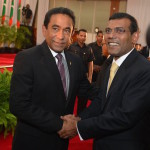The ruling Maldivian Democratic Party (MDP) and opposition Dhivehi Rayyithunge Party (DRP) have staked rival positions on the economic reform bills currently before parliament.
With two pieces of legislation of the 18-bill reform package completed by committee and up for a final vote next week, the majority and minority parties in parliament declared their stands at press conferences yesterday.
Briefing press at the MDP office, Majority Leader Ibrahim ‘Ibu’ Mohamed Solih stressed that the ruling party was “open to amendments from the opposition and ready to incorporate changes” to the General Goods and Services Tax (G-GST) bill and amendments to the Import-Export Act to excise and reduce import duties.
As of the 4:00pm deadline on Tuesday to submit amendments, Ibu Solih revealed that the MDP has proposed amendments requested by the Maldives Inland Revenue Authority (MIRA) and taken on board recommendations by the Maldives Association of Tourism Industry (MATI), Maldives Association of Construction Industry (MACI) as well as small businesses.
MDP has proposed completely excising import duties for fisheries and agriculture equipment and machinery, Ibu said, while maintaining current tariffs for imported fruits and vegetables to protect local farmers.
The proposed GST of five percent would meanwhile be reduced to 3.5 percent from October to December 2011, explained MP Abdul Raheem Abdulla, after which it would be raised to five percent next year.
Small businesses and “corner shops” would be exempt from the General GST, he added.
DRP Deputy Leader Ahmed Mohamed and MP Dr Abdulla Mausoom meanwhile told press yesterday that the party would oppose the introduction of a personal income tax.
“The main reason is that is going to be taken directly from the people,” said Ahmed Mohamed, former CEO of the State Trading Organisation (STO). “We will do everything we can to see that the bill does not get passed.”
As MDP currently has enough votes to pass the bill, he continued, the party would seek the support of other opposition MPs and Independents.
In addition, the main opposition party would attempt to delay the implementation of the tax bills to provide more time for both the public and businesses to adapt to the new system.
Moreover, the minority party would oppose an amendment to the Immigration Act, which would provide resident visas for skilled expatriate workers, as the party believes the move would make it harder for Maldivians to find employment.
DRP MP for Kelaa Dr Abdulla Mausoom told Minivan News earlier this week that the party would propose retaining import duties for “watermelons, papaya, bananas and mangoes to protect local farmers” to ensure price competitiveness for local agricultural produce.
“The rest is the way the MDP wanted,” he said. “With the numbers in parliament right now, MDP can pass bills the way they want.”
Following a meeting with President Mohamed Nasheed Saturday night, DRP Leader Ahmed Thasmeen Ali told press that the party “will not accept” proposed growth in state expenditure for 2012 and 2013 as “it would not be sustainable.”
Appearing on private broadcaster DhiTV the following night, Thasmeen said that state expenditure levels reaching over 60 percent of GDP was worrying.
“The figure has become so high because expenditure from the budget increased in response to special circumstances of the [December 2004] tsunami has been maintained at that level,” he explained.
While acknowledging that additional revenue was needed to finance the deficit accumulated since 2005, Thasmeen said that he objected to a proposed growth of about Rf1 billion in expenditure in 2013 since it was unclear how the increased spending would spur economic growth and improve productivity.
Responding to the minority leader’s statements, Ibu Solih said yesterday that increased expenditure was necessary to plug the inherit budget deficit and service high levels of public debt.
“13.9 percent of expenditure from the 2010 budget was for paying back loans,” Ibu noted. “There is no way we can escape that.”
The MDP MP for Hinnavaru asserted that the “answer to opposition concerns of how taxation proceeds would be utilised” was the fiscal responsibility bill proposed by the government, which would impose limits on spending and restrict annual growth of public debt to 3.5 percent per year.
Meanwhile at today’s sitting of parliament the committee report on the G-GST bill was presented to the floor, after which MPs were invited to submit amendments.
Some 39 amendments were submitted to the draft legislation while voting is due to take place when the sitting resumes at 10:00pm tonight.






The other day the dud CHASMEEN ALI stated that he will block personal income tax bill since the general public of Maldives have to pay for the proposed personal income tax bill if passed by the Majlis. I wonder if this lousy repulsive dud understand how many persons or which percentage of Maldivians earns Maldivian rufiyaa 30000 per month.
Most of Maldivians live hand to mouth and most of us do not have a proper meal per day and sleep in rat holes.
Ahmed Mohamed is concerned that income tax is going to be taken from the public. But Ahmed Mohamed knows that this public would mostly be people like him who makes more that 30,000 per month. Which 30k making public is he protecting. Certainly no DRP grassroots would make that much. Most of them are middle aged women and old folks who live mostly in the islands.
I think what these two-faced politicians are concerned is that their income has to be declared. Then watch how appalled their DRP public would be when they learn how much their male'-home-owning leaders make.
We have been indirectly taxing the poor for decades. Let us stop that and declare where the government gets all its revenues. If you believe in zakath, then certainly a system of taxing the rich for the survival of the poor should not be repulsive to you.
I think we can increase revenue, but we have to substantially reduce the public service payroll. I think we should not delay or reduce the GST at the cost of social services to the public. MDP must do this in order to be elected to office in 2013.
Overtaxing the "rich" will have a trickle-down effect on the "poor".
The way a lot of the people are commenting over here does not take into account that the MDP itself is led by, financed by and dependent on the upper-middle class as well as land-owning aristocrats.
Why would Andey propose something which saves those individuals as well? Hmmm....?
We have to start tax system as soon as possible simply because Customs duty that we are familiar with was an indirect tax from the poor for quite long time.
I call the poor all those who have to pay rent for their shelter, all those who have to pay for the health-care facility, all those who have to pay for higher studies and all those who have no proper jobs because of the country's job market domination by skilled and unskilled expatriate work-force
In which country are people taxed on other things without taxing on income tax? C'mon Thasneem, you failed to stand up against Maumoon. Be a man, be a leader and pass the tax bills